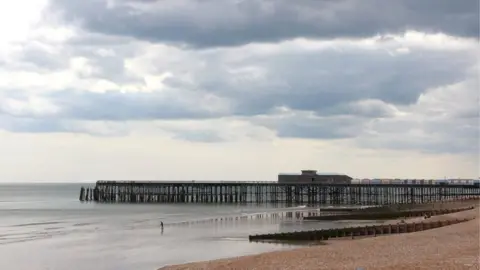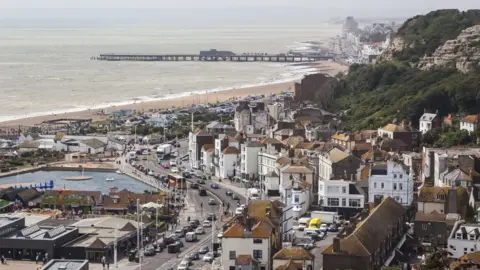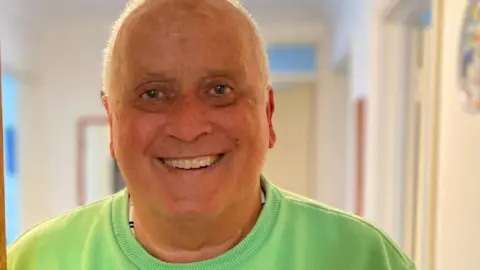Hastings: Neighbours in deprived town lend a helping a hand
Hastings has been one of the most deprived towns in England for decades, despite millions of pounds of investment. Grassroots charities are stepping into the fray, with neighbour helping neighbour.
Heating or eating. It is a catchy phrase that has been used by the likes of politicians, journalists and campaigners as a shorthand for the daily dilemma facing people who are struggling to make ends meet.
For Tracey Lavender, it is her reality.
"I sit there sometimes and I cry," she said. "I've just sat there in my front room and cried, because I haven't been able to pay my rent, to pay my bills, but I always get my kids to eat."
The mother-of-four had to stop working as a carer in January to look after one of her children.
Without the help of Hastings-based food charity Dom's Food Mission she would face a stark choice.
"It would either be bills or food," she said. "There is no in between, I can't get them both."

England's chief medical officer Chris Whitty used his 2021 annual report to cast a spotlight on the "overlooked" issues in coastal towns, which have higher rates of poor health and lower life expectancies.
The challenges facing towns such as Blackpool, Skegness and Hastings have more in common with each other than their inland neighbouring towns, he said.
Life expectancies in the most deprived parts of Hastings are 11 years lower than Crowborough, 25 miles away in East Sussex.
But Prof Whitty's report also praised the town's "strong sense of identity and community", adding that the pandemic had demonstrated "the passion, organisational skills, creativity and effectiveness of Hastings" as volunteers stepped forward to help.
Today, Lewis Pennington, 23, says "the future seems bright". But it could have been very different, without the help of older men from Hastings who have seen it all before.
After being kicked out of school, he quickly "went down the wrong path", and began selling drugs for gangs based in London.
"There's not much to do around here, so naturally you turn to violence or crime or selling drugs," he said.
 Getty Images
Getty ImagesSchool attendance and attainment are low in Hastings, while high levels of children grow up in poor households, according to Prof Whitty's report.
Mr Pennington believes a lack of opportunities makes some young people in his hometown easy prey for county lines gangs - dealers based in cities who are known to groom vulnerable drug runners to do their bidding.
Mr Pennington came to recognise the "dark sides" of the lifestyle after being stabbed, assaulted and "doing horrible things for horrible people".
But he credits grassroots charity A Band of Brothers, which pairs young men with older mentors, with helping him turn his back on crime four years ago.
Many of the volunteer mentors have overcome similar brushes with the law and experienced decades of life in deprived communities, he said.
"They put me onto the right path and there's nothing stopping me now," he said.

To learn more about the challenges facing coastal communities, watch BBC South East Today on BBC One at 18:30 BST on 27 September, or on BBC iPlayer for 24 hours afterwards.

According to Prof Whitty's report, £90m has been pumped into "social and economic interventions" in Hastings and surrounding communities in the past 20 years.
While it is thought to have halted declining standards, the town has remained the most deprived in the region.
Increasing secondary school attainment and improving transport infrastructure are the key challenges for the town, said Sally-Ann Hart, the Conservative MP for Hasting and Rye.

Chris Thomas, 77, was having so much difficulty making his regular medical appointments that he began to wonder if it was worth the effort.
The series of bus trips were unmanageable with limited mobility and the cost of taxis was fast becoming unsustainable, he said.
Earlier this month, volunteers from Hastings Heart stepped in, providing lifts to hospitals and the GP surgery.
For Mr Thomas, though, it is not only a logistical fix. Being greeted by a "smiling" volunteer, happy to lend an ear on the journey, has also helped to tackle a sense of loneliness.
"They've cheered up a day that is normally very dull," he said. "For me, being on my own, it's seeing that smiling face when you start. A smiling face when you get back."
 Getty Images
Getty ImagesAlastair Fairley, co-founder of Hastings Heart, said he was not "surprised at all by Chris Whitty's report".
"We are continuing to see more people out there that need help," he said.
"We know services are stretched. We will do whatever we can to help people who are struggling. We are just helping each other really."
The multiple, complex issues driving health inequalities and deprivation in the town had no "straightforward fix", he said.
The solution, he believes, is not only extra funding, but a wholesale shift of focus.
"We need to be looking at people's health, rather than just their sickness," he said.
"We need to be looking at what are the things that are causing people to be unwell, rather than just treating their ailments through the NHS."

Follow BBC South East on Facebook, on Twitter, and on Instagram. Send your story ideas to [email protected].
